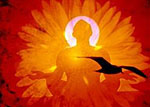|
|
|
|
|
|
|
|
|
Alternatives
to
|
Anxiety | ||
|
|
|
||
|
|
|||
 Tranquility
|
Many people who've struggled with anxiety often feel overwhelmed ~ this can lead them to consider suicide. If you are thinking about suicide, you can call a suicide prevention hotline for support ~ most hotlines operate 24 hours a day and have trained, caring counselors available to listen. In Marin County, CA, call 415-499-1100. If you've been overwhelmed by anxiety, you may feel you don't know how save yourself. But a phone call to a friend, a doctor or a hotline can be enough to begin healing. Check below for more information on holistic and other ways to control anxiety. |
||
|
|
|||
| From "The Serenity Prayer"(1) | |||
|
|||
|
|||
|
|||
|
|
|||
|
|
Introduction Anxiety ~ fear or anticipation of an undesirable outcome ~ is a normal part of human experience. Anxiety can be very helpful in life. For example, feeling anxious that the battery is dead in your smoke detector may motivate you to purchase a new battery, which might save your life.(2) And an appropriate sense of anxiety in life-threatening situations can also save your life, especially when surface appearances indicate a lack of danger.(3) Most of us know what it's like to get tense in a situation that's important to us ~ to have butterflies in our stomach before speaking to an audience, to get nervous on a date, or to get anxious around insects or snakes. These anxieties are common and understandable.(4) Anxiety can also be seen as a warning that something in one's life has gone - or is about to go - amiss. It is a signal that a problem has gone unattended, often suppressed from conscious awareness or just denied. While anxiety is unpleasant, and severe anxiety most unpleasant, anxiety always represents an opportunity to examine those elements of one's psychological life that have been left un-addressed. Anxiety is thus a call to pay attention, to become aware, to become conscious of problems one needs to deal with constructively.(5) |
||
|
|
|||
| Types of Anxiety | |||
|
Anxiety is considered a disorder when we feel that we cannot control our anxious feelings. Excess or uncontrollable anxiety can contribute to a wide variety of distressing symptoms and patterns of behavior, including panic attacks, agoraphobia, obsessions, compulsions, phobias, avoidance, and intense discomfort caused by heart palpitations, shortness of breath, nausea, hallucinations, and increased arousal (insomnia, anger, difficulty concentrating, etc.). The following are some terms therapists use to refer to anxiety symptoms and disorders(6): Panic attacks ~ a discrete period in which there is the sudden onset of apprehension, fearfulness or terror, often associated with feelings of impending doom. Symptoms such as shortness of breath, palpitations or chest pain, and fear of "going crazy" or losing control are present. Agoraphobia ~ anxiety about or avoidance of places or situations from which escape might be difficult or embarassing or in which help may not be available if a panic attack or panic-like symptoms occur. Panic Disorder with/without Agoraphobia ~ recurrent unexpected panic attacks, sometimes accompanied by Agoraphobia. Agoraphobia without Panic Disorder ~ panic-like symptoms and agoraphobia without a history of unexpected panic attacks. Specific Phobias, including Social Phobia ~ anxiety provoked by a specific feared object or situation (including social or performance situations); the phobic person usually compulsively avoids the provoking object or situation. Obsessive-Compulsive Disorder (OCD) ~ OCD sufferers are beset by obsessions, which cause anxiety, and compulsions, which are attempts to neutralize the anxiety. For example, if obsessed about germs (obsession), someone might feel they must wash their hands repeatedly (compulsion) in order to maintain cleanliness (neutralize the anxiety). Posttraumatic Stress Disorder (PTSD) ~ the reexperiencing of extremely traumatic event(s) (usually life-threatening) accompanied by symptoms of arousal (insomnia, anger, etc.) and active or passive avoidance of people, places and things associated with the trauma(s). Acute Stress Disorder ~ symptoms similar to PTSD that occur immediately after an extremely traumatic event. Generalized
Anxiety Disorder ~ at least 6 months of persistent and excessive
anxiety and worry. Anxiety Due to Medical Condition or Substance ~ symptoms of anxiety caused by a medical condition (such as respiratory or cardiovascular disease) or a substance (such as drugs of abuse, medication or a toxin). |
|||
|
|
|||
| back to top | Ways to Heal(7) | ||
Holistic
Approaches
|
|||
| Other Treatment Options | |||
|
Other options for healing anxiety include medication, cognitive-behavioral psychotherapy, family education, and ways to improve communication, coping and problem-solving skills, as well as self-esteem. If you are suffering from excess or uncontrollable anxiety and fear, call your doctor, psychotherapist, or other health professional for advice and support in regaining a sense of control over your feelings and a sense of trust about the future. |
|||
|
Some Thoughts on Medication(8)
|
|||
|
|
|||
| Sources: | |||
| 1. "The Serenity Prayer", 2002. Sobriety & Recovery Resources. http://www.recoveryresources.org/serenity.html | |||
| 2. "What Are Anxiety Disorders?". 2001. National Anxiety Foundation. http://www.lexington-on-line.com/naf.html | |||
| 3. de Becker, Gavin, "The Gift of Fear". 1997. Little, Brown & Co. | |||
| 4. "Anxiety Disorders". 2000. The Anxiety Panic Internet Resource. http://www.algy.com/anxiety/anxiety.html | |||
| 5. "Theory & Practice". 2002. Natural Psychotherapy International. http://www.naturalpsychotherapy.com/theoryWtop.htm#2 | |||
| 6. "Diagnositic & Statistical Manual of Mental Disorders, 4th Ed. (DSM-IV)", p. 393. 1994. American Psychiatric Association (Washington, DC). | |||
| 7. "Common Sense Care", 2002. Holistic-online.com. http://www.holisticonline.com/Remedies/Anxiety/anx_common_sense.htm | |||
| 8. from "Prevention", 2002. The Anxiety Panic Hub. http://www.panicattacks.com.au/about/anxdis/prevention.html | |||
|
|
|||||||||||
| Terms of Use |
All
content property of the respective owners ~ Website © 2021 Therapy Alternatives
|
||||||||||

